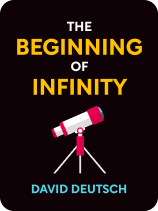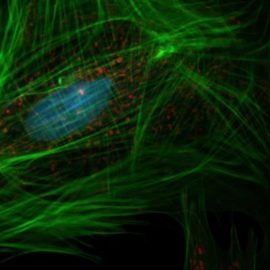

This article is an excerpt from the Shortform book guide to "The Beginning of Infinity" by David Deutsch. Shortform has the world's best summaries and analyses of books you should be reading.
Like this article? Sign up for a free trial here .
Why should we be optimistic about the future? Why is infinite knowledge vital for our future?
There are so many pessimistic predictions about the future, but there are based on our current knowledge. Accepting that there is more to learn can better improve lives and create an optimistic outlook for the future.
Read why The Beginning of Infinity‘s author David Deutsch says infinite knowledge creates infinite optimism.
When Knowledge Becomes Universal
While knowledge usually grows incrementally (discoveries building step-by-step on those that came before), sometimes one of those discoveries has far-reaching, even universal, implications. Thinking big about knowledge is the key to being optimistic about the future.
For example, as scientists studied what matter is made of, breaking it down into smaller and smaller parts, they eventually discovered the elements of the periodic table and the atoms that compose them. We now know that everything—from sand to stars to our own bodies—is made of those atoms in various combinations.
In theory, by finding the right ways to combine the elements of the periodic table, we could create anything we can imagine. Deutsch says we can’t do that yet because we don’t fully understand the universality of the atom. In other words, we know (to some extent) what atoms are and how they behave, but we don’t know why everything is made of atoms, and why certain combinations of atoms create certain things. Think of atoms as the alphabet of the universe: Once we fully understand the rules that gave rise to it, we’ll be able to arrange the letters into any words we want. Once we have that breakthrough, our understanding of atoms and elements will become universal.
The Search for Universal Truth
According to theoretical physicist Stephen Hawking, the search for these pieces of universal knowledge is the ultimate purpose of science. In A Brief History of Time, Hawking explains that science currently has two prevailing theories that explain how the universe works:
- General relativity accurately explains and predicts how large objects behave (in physics terms, “large” generally means “big enough to see with the naked eye”). However, it cannot explain how subatomic particles such as electrons behave.
- Quantum mechanics can somewhat explain the behavior of those subatomic particles, but it operates with completely different rules than general relativity. Furthermore, quantum mechanics is still imprecise, only offering results in terms of probability rather than certain outcomes.
Hawking says that the final goal of physics is to combine these two theories into a Grand Unified Theory that applies to any type of physics problem—what Deutsch would call a piece of “universal knowledge.” However, so far the two theories have proven incompatible, meaning that we need more incremental advancements before we can achieve Hawking’s dream of a universal theory of everything.
The Case for Optimism
We’ve discussed various ways in which humans create knowledge, and how we could continue creating knowledge forever. However, all of that begs the question: So what? For Deutsch, the potential to create infinite knowledge is grounds for infinite optimism about the future.
First of all, there have been—and continue to be—many pessimistic predictions about the future. For example, there have been numerous projections about how many human beings Earth can support, some of which estimated under a billion people; clearly, we’ve far surpassed those predictions. Today, many scientists predict that climate change will devastate much of the world, perhaps within our lifetimes, but there’s hope that we can overturn those predictions as well.
Such predictions were—and are—based on current knowledge. We’ve exceeded expectations many times before, and that’s because there’s no way of knowing what we’ll know in the future. Therefore, Deutsch rejects such pessimism and instead offers a knowledge-based argument for embracing optimism.
First, he starts with the assumption that knowledge alleviates suffering. Because we develop new knowledge to answer questions and solve problems, every bit of knowledge we acquire reduces suffering in the world by a tiny bit. Second, he reiterates that knowledge is infinite. In short: There’s no limit to what we can learn, and therefore there’s no limit to how much we can reduce suffering in the world.
We Don’t Know What We’ll Know
Perhaps one of the most optimistic visions of the future comes from Lifespan, written by geneticist David Sinclair. Sinclair predicts that Earth can support a theoretically infinite number of people, that our quality of life will improve endlessly, and that someday people will be able to live forever.
Some of these predictions—especially about overcoming aging and living forever—are based on Sinclair’s own work as a scientist, but others are rooted in the same optimism that Deutsch has: That knowledge can increase endlessly, and that there’s no way of knowing what we’ll know in the future.
As a proof of concept, Sinclair points out that the last two centuries have seen the biggest population boom in the history of the world, driven in large part by increased life expectancy; at the same time, the average quality of life has increased drastically. He doesn’t see any reason why those trends should suddenly reverse.

———End of Preview———
Like what you just read? Read the rest of the world's best book summary and analysis of David Deutsch's "The Beginning of Infinity" at Shortform .
Here's what you'll find in our full The Beginning of Infinity summary :
- That there is an infinite amount of knowledge in the universe
- Why humanity must never stop learning
- How new knowledge changes civilization for the better






